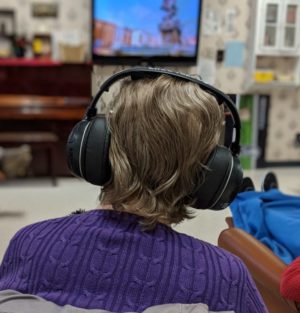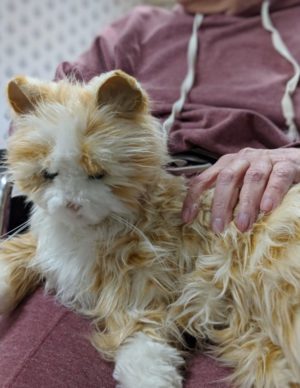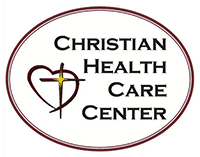[ Editor’s note: This article was updated Nov. 25, 2020, to better reflect current programs. ]
In Christian Health Care Center’s memory care residence, healthcare professionals employ a number of different methods to supervise and care for residents in a home-like setting. Days are spent helping individuals engage, helping them relax, helping improve their quality of life.
“We develop and organize enriching activities that are designed to inspire moments of joy,” says Josh Friesen, a social worker who runs many of the therapeutic recreation programs for memory care residents at CHCC. “The training and tools we have provides each person under our care a better quality of life through meaningful engagement, including social engagement. Even though dementia is a tragic, progressive disease process, we have a wonderful opportunity to meet them in the place where they’re at on any given day.”
An increasingly important tool in that effort, he says, is technology. To help meet the needs of the people who live with memory impairments and improve their day-to-day lives, CHCC employs a number of tech-related tools.
Personalized music
CHCC uses iPods to create individualized music playlists for residents. Those who enjoy music seem to get a huge benefit from being able to listen to music that sparks certain happy memories or transports them to familiar times.
The center received a grant from LeadingAge Washington to purchase the necessary equipment for music therapy, Friesen says, and the results have been wonderful so far.
Community television

A large-screen, smart television in the common room comes in handy in a variety of ways, such as showing videos or even magazines that bring joy to all.
“With YouTube, we can call up content immediately, speaking right into the remote control,” Friesen says. “I’ll say things like, ‘Show me videos on YouTube of national parks, or babies laughing, or classic Western music performers,’ and the videos come right up.”
The TV also can be used to share engaging content with the group.
“Sometimes, I’ll have a really good magazine that I want to share with everyone,” Friesen says. “I can take a picture with the iPad and cast it right away to the TV. This ‘casting’ capability opens up a lot of opportunity for our staff to engage the group in a shared experience with a variety of media.”
The smart TV also is used to display song lyrics during chaplain services, to display calming background imagery, to play soothing nature sounds, and to show movies.
Of course, in a community setting, not everyone will want to do the same thing at once. Wireless headphones, each with its own volume control, allow some to watch movies while others rest and relax.
Robotic pets

Favorite additions to the memory care center in Lynden are the cute and cuddly robotic dog and cat, which offer novel ways of interacting with long-term care residents, Friesen says.
“The pets are a lot of fun — a great source of fun and engagement,” he says.
The dog barks, nods and wags its tail, and the cat rolls over, purrs and meows. Residents find the Joy for All Companion Pets quite soothing and relaxing, Friesen says, often just sitting and petting them. They can be helpful during chaplain services, for example, by helping soothe residents so they can be more engaged in the service, he says.
Audiobooks
“In a dementia care environment, we have people with varying degrees of ability and disability, and sometimes e-books aren’t the best option,” Friesen says. “Audiobooks, however, provide great engagement for each person.”
Friesen uses tablet computers to connect to the Whatcom County Library System and download audiobooks on demand. People who live in the long-term care memory residence can listen to treasured stories while relaxing or engaging in other tasks. The audiobooks work so well that Friesen would actually like to get some more iPads so more people can listen to audiobooks simultaneously.
Community music
In addition to personalized, individual music playlists, memory care specialists engage individuals through group music sessions and other community events.
Friesen has a 360-degree bluetooth speaker that he can place in the center of a circle of people to enhance social listening and interaction.
“We also have a lot of group dynamic programs coming through here — performers, piano players, church services and more,” he says. “Sometimes, this technology is a nice complement to something that’s already going on, and it helps to keep people engaged.”
The ultimate goal at CHCC, Friesen says, is to help improve quality of life, making each day better in notable ways. That sometimes is challenging in a memory care environment, he says, but the staff continue to learn and grow as they employ different ways of reaching each person.
“Technology is helping us connect and build meaningful relationships with our residents. It provides us with a wide variety of tools that often inspire moments of joy,” Friesen says. “In spite of the challenges and changes of the dementia disease process, it is exciting to see ways in which technology is allowing us to get know each other again.”
